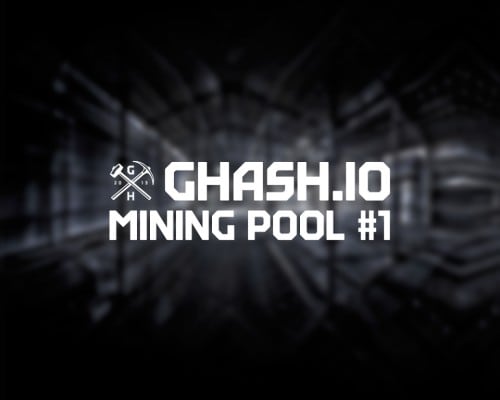
This past week saw GHash.io thrown back under the Bitcoin communal spotlight after they again gained 51 percent control of the entire mining pool, this time for 12 hours. GHash put out a press release Monday asking the Bitcoin community to do the unthinkable: trust them.
“Our investment, participation and highly motivated staff confirm it is our intention to help protect and grow the broad acceptance of Bitcoin and categorically in no way harm or damage it,” said Jeffrey Smith, CIO of GHash. “We never have and never will participate in any 51 percent attack or double spend against Bitcoin. Still, we are against temporary solutions, which could repel a 51 percent threat.”
GHash may very well be a respectable and trustworthy group of people, but that’s beside the point. One of the main selling points of Bitcoin is that it’s designed to be a trust-less system, requiring no trust to be placed with a single entity for its success. Trust must only be placed in the open-source code, which is available for anyone to inspect for possibly detrimental irregularities.
Placing trust in a single mining pool could turn out to be Bitcoin’s Achilles’ heel. As we reported on Monday, a mining pool with over 50 percent control “could reject competing miners’ transactions, demand higher fees from individuals with larger holdings and may even spend the same bitcoins twice.” DDoS attacks could even be conducted.
However, if a mining pool did act maliciously, people in the Bitcoin community would notice — due to the transparent nature of the block chain – and act accordingly, which would likely be the end of that mining pool. But such malicious acts could happen inadvertently, from a rogue employee or compromised system.
And again, placing trust in a single Bitcoin mining entity who has the power to disrupt the growth of Bitcoin, intentionally or not, could be compared to placing trust in the Federal Reserve; trusting that they won’t devalue the dollar too much, or cause a great depression.
A seemingly widely supported solution to the 51 percent problem would be for GHash to implement fees that increase as they near 50 percent, which would no doubt hinder their growth as an organization. But GHash seems to think that these types of fees are unrealistic and temporary solutions which fail to address the core problem.
They said in their press release:
“In any market, competition and innovation drives growth and that is particularly true in an emerging and disruptive environment such as Bitcoin. Successful and innovative companies cannot be expected to limit their growth or competitiveness as a direct result of their success[…] Implementing a pool fee to our pool contradicts principles of our operation from the very launch of GHash.IO. It also does not address the core issue only pushing the problem a few weeks or months down the road when another pool or perhaps GHash.IO again grows towards 51 percent.”
As noted by Reddit user Max_Findus, any successful market depends on influential players behaving in a rational and knowledgeable manner. In the case of GHash controlling 51 percent of the mining pool, a rational and knowledgeable GHash would realize that the value of Bitcoin significantly decreases as a mining pool reaches 50 percent, and would limit their growth in order to maximize profits.
The GHash press release continued with the following proposals:
“We also recognize however that a long term preventative solution to the threat of a 51% attack does have to be found, the current situation we find ourselves in (essentially being punished for our success) is damaging not only to us, but to the growth and acceptance of Bitcoin long term, which is something we are all striving for.
To that effect we are in the process of arranging contact to the leading mining pools and Bitcoin Foundation to propose a ‘round table’ meeting of the key players with the aim of discussing and negotiating collectively ways to address the decentralization of mining as an industry. Our aim is to do this quickly with a possible date coinciding with the CoinSummit Conference in London.”
This is certainly a step in the right direction. Inter-pool discussions have reportedly been taking place since 2012, and so far, GHash has been the only major pool not involved in the discussions. Hopefully with their support, the community can agree upon measures that can be taken to indefinitely prevent future 51 percent scares.
And then there are those on Reddit claiming that the recent GHash press release directly contradicts past GHash actions.
“GHash/CEX also states that they do not wish to engage in a 51 percent attack or commit double-spends. This is a direct contradiction from when the community caught them engaging in double spends to cheat gambling sites,” wrote Reddit user ForestOfGrins.
The accusation refers to evidence presented to the Bitcoin community in October 2013, which seems to indicate that, at the very least, someone who was at one point associated with GHash was involved in double spending.
CEX.IO, who took over GHash development after the project was transferred to them in October 2013, released a statement in November 2013 regarding the accusation, part of which stated:
“Following further investigation and server log analysis we have noticed that several private keys were imported to the GHash.IO wallet within that time period. (exact date could not be determined). This was done to conceal the missing bitcoins, since there was no direct deposit transaction.”
And here’s the shocker:
“We haven’t found any signs of the system being compromised, but we believe that the attack was made from within the former development team. At the moment CEX.IO LTD is the lawful owner of the CEX.IO and GHash.IO projects as well as their domains. Our team at CEX.IO LTD. will do everything possible to prevent pool capacity manipulation in the future. We understand the communities’ concern about the misconduct of such great computing power at our pool (since recently we have become the #1 pool), and we will gladly take into consideration any comments or suggestions to improve the pool’s security and overall quality of service.”
No doubt a damning admission, and hopefully something that will never be repeated by anyone associated with Bitcoin mining pools.







